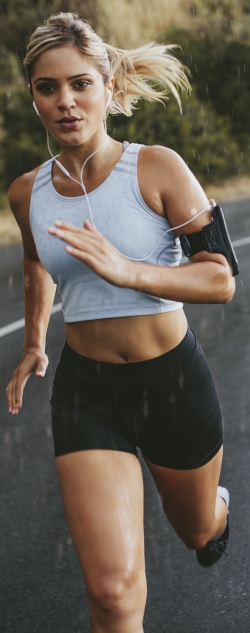
Fat and water-soluble vitamins

Vitamins are organic compounds of small molecular mass of which we only need a very small quantity, yet they are extremely important in the management of the body.
They are divided into two large groups: the ones that are water-soluble and the ones that are fat-soluble.
Fat-soluble vitamins:
You should pay attention to taking them, because they accumulate in the body, therefore there can be an overdose of these vitamins.
- Vitamin A (retinol)
Your body needs it for a healthy skin and mucous membrane, but it also serves as a catalyst in a number of metabolic processes. It protects against infections, and it guards the epithelial cells.
It can be replenished in the form of its previtamin – carotene – from plants, and it is present as a vitamin itself in animal sources. It is stored in the liver.
Food sources: liver, butter, egg yolk, carrot, cantaloupe, spinach.
- Vitamin D (calciferol)
The UV rays of the sun transform its previtamin into vitamin D3. It plays an important role in the maintenance of the bone structure.
When consumed with vitamins A and C it helps the functioning of the immune system, because it helps to activate the T-cells, but it is important to protect the joints as well.
Food sources: egg yolk, butter, oily fish, sardines and cod liver oil.
- Vitamin E (tocopherol)
It is not only indispensable for the operation of the hormonal system, but its deficiency can result in muscular atrophy, so it is important for the preservation of your muscles, but it’s also an excellent antioxidant.
Food sources: vegetable oils, nuts, oily seeds, green plants.
- Vitamin K (phylloquinone)
It plays an important role in blood coagulation. The bladder is required for its absorption, therefore it cannot be absorbed if someone is suffering from liver and kidney disease, and colitis is formed if there is a lack of it. It is produced by intestinal bacteria (K1) and can be found mostly in green plants (K2).
 Water-soluble vitamins:
Water-soluble vitamins:
Let’s not forget about their replenishment, because they are depleted from the body. Without being comprehensive, let’s consider what they are and how they can be replenished.
There are certain physiological factors such as smoking, active sports, pregnancy, lasting disease and stress that increases the need for them.
- Vitamins B
They are very important both for weight loss and bulking, because they plan a significant role in the regulation of the metabolism of macronutrients, proteins, fat and carbohydrates. At the same time, they are also essential to the health of the hair and the skin. During weight loss attention should be paid to the intake of folic acid, too.
If there are wholemeal cereals, pulses, liver, whole eggs, meat, maybe yeast on our plate, they you have done a great deal to replenish these vitamins.
- Vitamin P (permeability)
Must also be mentioned because it regulates the permeability of the capillaries. Vitamin P is a mixture of a number of active ingredients such as rutin, quercetin and citrine. Its deficiency can result in muscle weakness, allergies and a propensity for hyperhidrosis.
Food sources: rosehip, blackcurrant, plum, buckwheat.
-
Biotin
Contributes to a number of enzymatic processes, but it is also responsible for the protection of the epithelial tissue and the synthesis of fatty acids. Its deficiency results in irritability, fatigue, hair loss and skin dryness.
Food sources: liver, yeast, egg yolk, tomato, walnut and nuts, cauliflower, cheese.
- Vitamin H1
It is important to help digestion, absorption, excretion and its deficiency results in fatigue, distress, constipation, slow and difficult digestion. It can be found naturally in brewer’s yeast, yoghurt, wheat germ and beans.
- Vitamins C (ascorbic acid)
Everyone knows its immune system strengthening function, but you shouldn’t forget that it is required for the absorption of iron, it enhances the effect of adrenaline, and its deficiency results in nose and gum bleeding as well as fatigue. Since storage and thermic treatment helps in its breaking down, attention should be paid to avoid them during replenishment. Increased physical strain, fever, illness and smoking increases the need for it.
Vitamin C sources: fruits, casseroles, vegetables. Pickled or sour versions preserve it the longest without breaking down, therefore citrus fruits, sour cabbage, blackcurrant are the best sources.
It clearly shows how important a varied diet is, since we need vitamins for the healthy operation of the body. May your goal be weight loss, bulking or preserving your health, following a balanced diet is essential, and often times it is not even enough. In such occasions, you should look for replenishment options for some of the required vitamins. There are differences between sport types. Endurance sports require more vitamin C, B1 and A, power sports results in a higher vitamin B6 need. During competition the vitamin needs become even higher.
Gabriella Silye